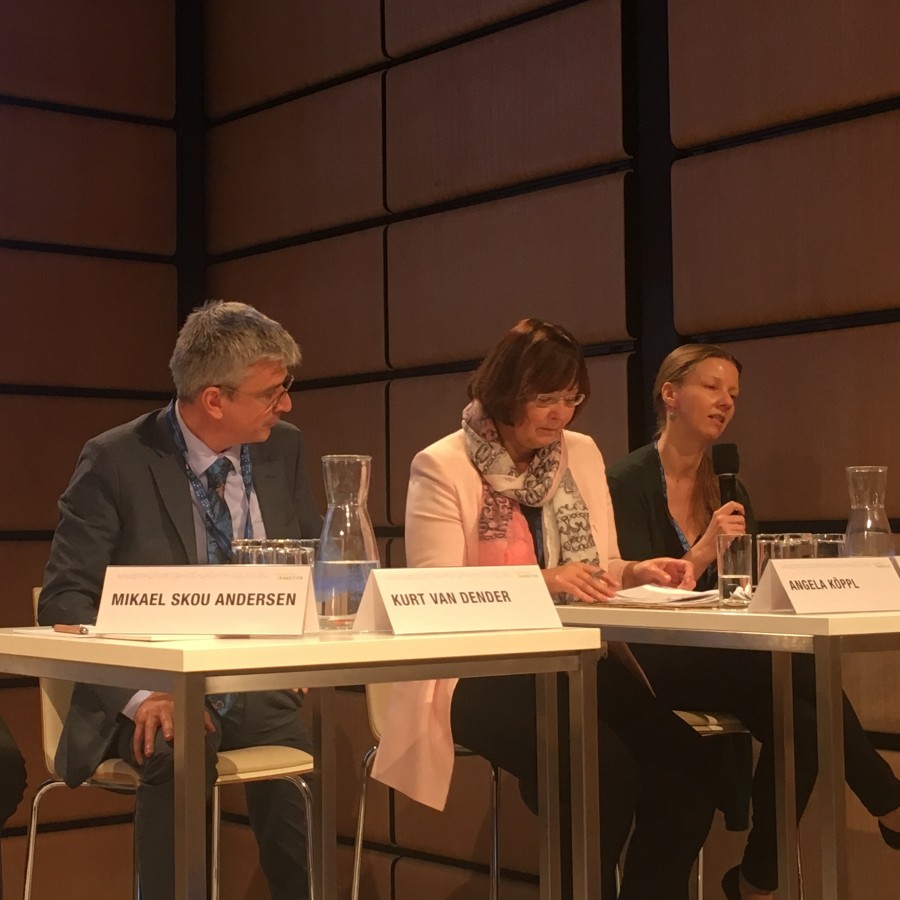The focus of the 4th International Growth in Transition Conference, which took place in Vienna on 14 and 15 November, was on social, environmental and economic transformation and innovation. The conference, which attracted some 700 participants from all over Europe, was organised by the Federal Ministry for Sustainability and Tourism and the Federal Environment Agency as part of the Austrian Presidency of the Council of the European Union and supported by the Ban Ki-moon Centre for Global Citizens. The conference was supported by Horizon 2020, the EU programme for research and innovation. WIFO contributed to the conference as one of 30 partner organisations that designed and implemented a most interesting conference programme.
WIFO Director Christoph Badelt discussed environmental and social transformation issues in a plenary debate with Kate Raworth, well-known for her concept of the "donut economy" and lecturer in Cambridge and Oxford, and Tim Jackson, Professor of Sustainable Development at the University of Surrey and author of "Prosperity without Growth".
The Breakout Session on "Fiscal Reforms for a Low-carbon Transition", moderated by WIFO Deputy Director Margit Schratzenstaller, focused on success factors for and obstacles to the implementation of market-based instruments in climate policy. Mikael Skou Andersen from Aarhus University (Denmark) and Kurt van Dender from the OECD presented international experiences and assessments of the effects of socio-ecological tax reforms on environmental, social and economic sustainability. WIFO environmental economist Angela Köppl presented first deliberations on a stronger focus of taxation, which is currently strongly focused on flows (such as CO2 emissions), towards stocks. Claudia Kettner-Marx, expert on environmental economics at WIFO, presented the results of simulations of the effects of a CO2 tax in Austria developed in the CATs project. For the ensuing discussion, the auditorium was divided into three groups: Consumers, business representatives, and politicians, who were asked to identify the conditions under which they would support a socio-ecological fiscal reform in order to identify success factors for and obstacles to its implementation.
The breakout session "The SDGs as Compass for Transformation" focused on the interactions between the UN sustainability goals (UN SDGs). Moderator Beate Littig (IHS) first asked people from the audience about their views on the relevance of the SGS in their countries of origin. Prof. Nebosja Nakicenovic (IIASA) emphasized in his keynote the importance of considering the SDGs and the interrelations between in an overall perspective. To achieve the SDGs and sustainable development beyond 2030, immediate action and a focus on people and the planet are essential. In their short presentations, Fritz Hinterberger (SERI), WIFO environmental economist Daniela Kletzan-Slamanig and Willi Haas (BOKU) summarised the results of their individual research projects with a focus on Austria. In the final discussion, the necessity of a coherent policy design geared to the SDGs was emphasised again.
More on this topic can be found on the conference website Growth in Transition and on the website of the WIFO project Carbon Taxes in Austria (CATs).


